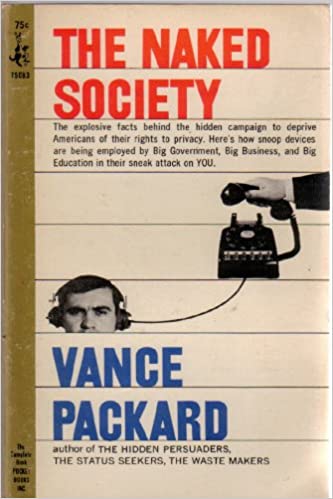Review:
Have you ever got that nasty feeling that you are being watched? Watched wherever you are, wherever you go, whatever you do?
I just finished a novel by James Patterson, called The Store, about which one reviewer had this to say: ‘This book is creepy because the premise is very real … Anything that you do online tells the world a little more about you. That information can be used against you.’ Patterson may have exaggerated things a bit, but the fact is that surveillance has become a fact of life.
We need to thank Vance Packard for alerting people about such surveillance when he wrote The Naked Society way back in 1964. The Naked Society is a ground-breaking work that explores the implications of technology and its effects on society.
In this book, Packard examines the rise of technology, the increasing accessibility of information, and the loss of privacy in modern society. I heard someone say the book is just as relevant today as it was when it was first written. I said what Packard was warning us against has become even more relevant today.
The book begins by examining the role of technology in modern life. Packard argued that technology had become all-pervasive in modern society, and that its effects were far-reaching.
Packard argues that technology has given rise to a culture of surveillance, in which individuals are constantly monitored and their every move is scrutinized. This surveillance is not just limited to the government or law enforcement agencies, but also extends to private corporations and businesses.
Packard argues that this surveillance culture has led to a loss of privacy, and that individuals are increasingly vulnerable to having their personal information exploited for commercial or political purposes.
Throughout the book, Packard provides numerous examples of how this surveillance culture is affecting modern society. He examines the use of lie detector tests in the workplace, the practice of wiretapping by law enforcement agencies, and the use of electronic surveillance in public places. He argues that these practices are not only invasive, but they also have serious implications for civil liberties and personal freedom.
One of the most striking aspects of The Naked Society is its prescience. Although it was written in the early 1960s, the book anticipates many of the technological developments that have since become commonplace.
Packard predicts the rise of the internet and the widespread use of personal computers, and he even envisions the possibility of a global network of interconnected computers. He also warns of the potential dangers of these developments, particularly in terms of the loss of privacy and the threat of surveillance.
In addition to its insights into the impact of technology on society, The Naked Society also explores the ethical and philosophical implications of these developments. Packard raises important questions about the role of technology in modern life, and about the extent to which individuals are willing to sacrifice their privacy and personal freedoms in the name of convenience and efficiency.
Perhaps the most important contribution of The Naked Society is its call to action. Packard wants individuals to become more aware of the dangers of a surveillance culture, and wants them to take steps to protect their personal privacy and civil liberties. He urges individuals to become more involved in political and social activism, and to demand greater transparency and accountability from government and private corporations.
Overall, The Naked Society is a powerful and thought-provoking book that raises important questions about the role of technology in modern society. Its insights and predictions remain just as relevant today as they were when the book was first written, and its call to action is more urgent than ever.
In an age of increasing surveillance and loss of privacy, The Naked Society is a timely and important reminder of the need to protect our personal freedoms and civil liberties.










